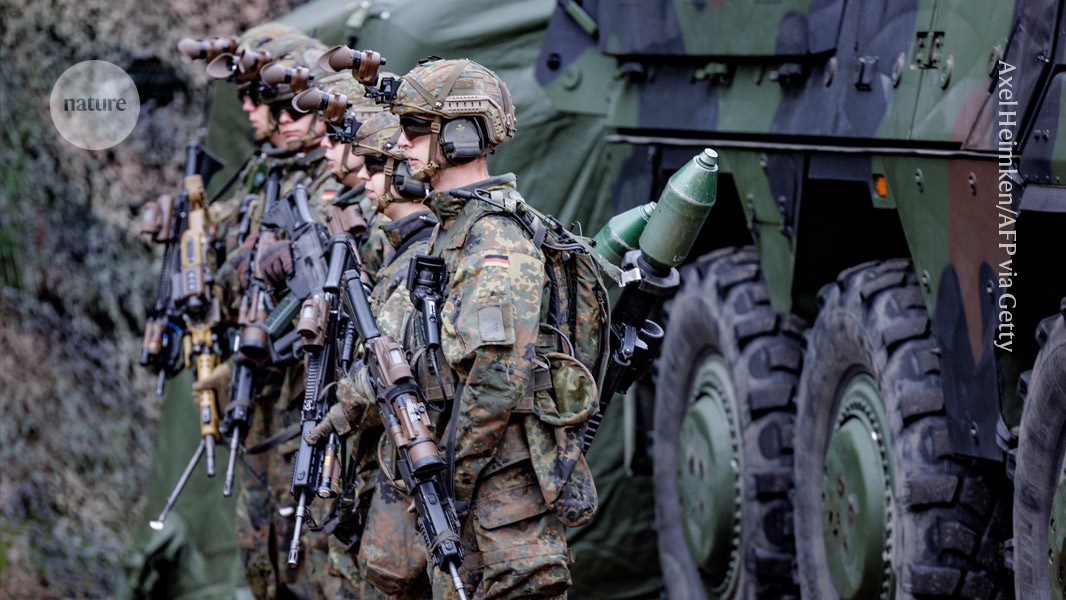Will Europe ramp up defence research? War prompts major rethink

Nations consider increasing universities’ involvement in military research
A drive to increase university participation in military research is gaining pace across Europe — and meeting resistance.
The European Commission is proposing ways to boost dual-use research — that with both civilian and military uses — including by bringing such studies into its flagship multibillion-euro research programme, from which they have historically been excluded. In Germany, the government is encouraging institutions to overturn decades-old policies that restrict research to peaceful purposes.
“There is a lot of pressure at the moment on research institutions and universities to change their long tradition in peaceful and civilian research, towards a more politically oriented policy,” says Hannes Jung, a particle physicist at the German Electron Synchrotron (DESY) in Hamburg and a member of the Science4Peace Forum, which campaigns to use science to promote peace. “I find that extremely worrying.”
The push comes amid increasing militarization of European research, which began after Russia’s incursions into Ukraine in 2014 and ramped up following the full-scale invasion in 2022. Boosting dual-use research is part of the European Union’s response to a “more threatening geopolitical context”, commission president Ursula von der Leyen has said.
Unlike after the Second World War, when government-backed military laboratories were major research hubs that often spun out civilian applications, today the military must “spin in” innovation from universities and industry, says James Black, who studies defence policy at RAND Europe, a research consultancy in Cambridge, UK.
Defence spending
The EU is in a different situation from the United States and China, which spend vastly more on military research and where academia and defence typically have closer ties. In China, researchers are often incentivized to engage with the military, says Fiona Quimbre, a senior analyst at RAND. Chinese military and academic centres are often located together, and many of their leaders have spent time working in both domains, she says. “The networks they’ve created are something that takes years to gain,” she says.
Meanwhile, Japan — which since the Second World War has been a pacifist nation — has over the past decade begun investing in research with possible military applications.
How involved European universities are in defence varies. Some institutions in western Europe have long-standing defence ties, but connections are more common in nations with a history of being invaded, for example in eastern Europe, as well as Nordic nations. Other nations have avoided such work.
The push to increase military research comes amid rising defence spending by EU countries. Investment grew by 10% from 2022 to 2023, to €279 billion (US$287 billion,) according to the European Defence Agency. Spending on research by the European Defence Fund (EDF), the EU’s main funder of military research and development, will rise to €2.7 billion for the 2021–27 period.
But the EDF has struggled with academic engagement. The bulk of its funding awards go to semi-governmental research, technology organizations, large defence industries and smaller companies.
Some researchers might ethically object to doing military research, but many don’t engage because of a lack of access or incentive, says Black. Military research can restrict collaboration and prevent publication, and there might be only a small market for products.
Civil versus military
Now, the European Commission’s new commissioners, who began their terms in December, will explore how the bloc might better harness the potential of dual-use research, says a commission spokesperson.
A white paper published last year proposed introducing dual-use research into the EU’s main civilian-research programme1, potentially in the next ‘framework programme’ known as FP10, which begins in 2028. Universities largely rejected this idea during consultation. Instead, academic groups preferred one of the commission’s alternative suggestions, to improve existing separate civilian- and military-funding schemes.
Merging the streams in the framework programme risks increasing bureaucracy and reducing international cooperation and resources for civilian research, says Walter Rosenthal, president of the Bonn-based German Rectors’ Conference, an association of 269 universities.

DESY, Germany’s largest particle-physics lab, is consulting staff on whether dual-use research can be conducted at its facilities.Credit: Patrick Pleul/dpa via Alamy
Germany pivots
Enjoying our latest content?
Login or create an account to continue
- Access the most recent journalism from Nature's award-winning team
- Explore the latest features & opinion covering groundbreaking research
or
Sign in or create an accountdoi: https://doi.org/10.1038/d41586-025-00117-z
This story originally appeared on: Nature - Author:Elizabeth Gibney


















